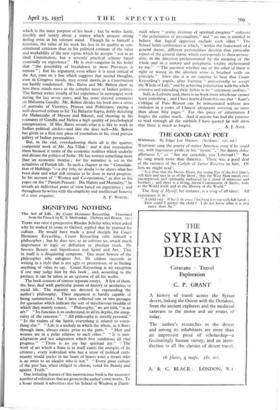SIGNIFYING NOTHING
The Art of Life. By Count Hermann Keyserling. Translated from the French by K. S. Shelvankar. (Selwyn and Blount. 15s.)
THERE was once a prospective Rhodes Scholar who, when asked why he wished to come to Oxford, replied that he yearned for culture. He would have made a good disciple for Count Hermann Keyserling. Count Keyserling calls himself a philosopher ; but he does not, so he informs us, attach much importance to logic or definition or absolute truth. He favours Beauty and Significance and Spirit and Art. This in itself is a disquieting symptom. One must beware of the philosopher who eulogizes Art. He seldom succeeds in writing in a style that is not ugly or pretentious, or in finding anything of value to say. Count Keyserling is no exception if one may judge him by this book ; and, according to the preface, it can be taken as an epitome of all his works.
The book consists of sixteen separate essays. A few of them, the best, deal with particular points of history or aesthetics or social life. The majority are devoted to expounding the author's philosophy. Their argument is hardly capable of being summarised ; but I have collected one or two passages for quotation which indicate the sort of mischievous twaddle of which they mainly consist. " Philosophy," we are told, " is an art." " Its function is to understand, in all its depths, the integ- rality of the concrete." " All philosophy is strictly personal." " In the realms of the Spirit, everything is related to every- thing else." " Life is a melody in which the whole, as it flows through time, always exists prior to the parts." " Men and women are in a polar relation to each other." " It is non- adaptation and not adaptation which first conditions all vital progress." " There is no joy but spiritual joy." " The work of art which a State is in itself exalts the energies of its citinns ; every individual who has a sense of political com- munity would prefer in his heart of hearts even a tyrant who is an artist to an idealist who is not." " Every great culture of the past has, when obliged to choose, voted for Beauty and against Truth."
One irritating feature of this meretricious book is the excessive number of references that are given to the author's own works. To a lesser extent it advertises also his School of Wisdom at Dann- stadt where " spirits desirous of spiritual progress " cultivate " the polarisation of personalities," and " no one is entitled to believe that logical opposites exclude each other." The School holds conferences at which, " within the framework of a general theme, different personalities develop that particular aspect of the general theme which corresponds to their person- ality, in the direction predetermined by the meaning of the whole and in a unitary and polyphonic totality orchestrated by me." " The question whether one or the other of them is right or wrong in the absolute sense is brushed aside on principle." After this it is no surprise to hear that Count Keyserling's pupils, after learning " unreservedly to accept the Whole of Life," end by achieving polarisation with the whole universe and extending their Selves to its " uttermost confines."
Still, as Leibnitz said, there is no book from which one cannot learn something ; and I have learned from this one that " Kant's Critique of Pure Reason can be reincarnated without any omission in a series of Chinese ideograms covering no more than about fifty pages." For this piece of information I forgive the author much. And if anyone has had the patience to read through all the rubbish I have quoted he will allow










































 Previous page
Previous page